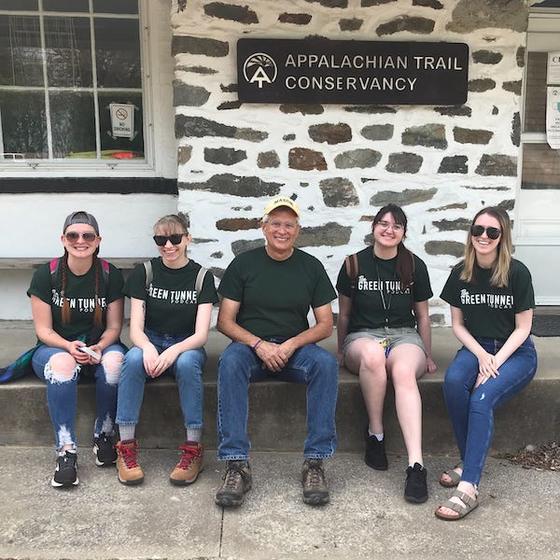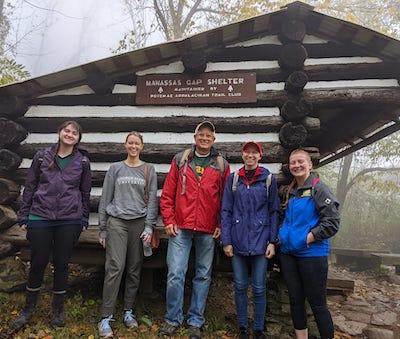The Green Tunnel podcast, hosted by George Mason University professor Mills Kelly, has recently reached 100,000 downloads, a milestone that puts the show in the top 3% of podcasts nationwide.
“We've achieved a lot, and we're so proud of it. We have some really devoted listeners; if we drop any new content, a thousand people download almost immediately,” said Kelly.

The podcast is produced through Mason’s Roy Rosenzweig Center for History and New Media (RRCHNM) and focuses on the history of the Appalachian Trail (AT), a prominent long-distance hiking trail along the East Coast that goes through 14 states from Georgia to Maine.
The project was initiated after the RRCHNM received a $1 million grant from the Mellon Foundation to fund R2 Studios, as well as conduct more fundraising and community outreach. The first episode of The Green Tunnel podcast was released on October 6, 2021, and the grant will fund the effort for another year.
“This show has given both graduate students and one amazing undergrad the opportunity to work on a professionally produced podcast,” said Kelly, who just completed a four-year term as the director of RRCHNM. "The students are the producers so they [choose] the topics and figure out who should be interviewed.”
Students who join the podcast can earn internship credit for Mason’s applied history program.
“Something unique about this podcast as far as student work goes is that it's very interdisciplinary. I think that's important considering that it's a history podcast,” said Bridget Bukovich, community engagement coordinator at RRCHNM, who started on the podcast as a Mason graduate intern.
Eleanor Magness has been hiking for most of her life. “I come from a long line of park rangers on my mom's side,” said the junior public history major.
Magness’ love of the trail led her to join the podcast as a freshman intern in 2021 where she wrote, researched, and edited entire podcast episodes, including Leave Only Footprints, Craving Community, and her personal favorite, Gear Up.
“I had full creative control, but Mills was always available to help me and answer any questions I had,” said Magness, who is also in the Honors College.

Hayley Madl is a third-year PhD history student who specializes in community-engaged indigenous history. Madl produced the Native Persistence episode, which featured Mason associate history professor Gabrielle Tayac, a member of the Piscataway Indian Nation.
“It was a great opportunity for me to do community-engaged work in indigenous history and talk to native communities,” said Madl.
Madl is from western Pennsylvania, and her favorite hiking location is Allegheny National Forest in Marienville, Pennsylvania. Two of her brothers have completed AT thru-hikes, and Madl also hopes to complete one.
"The AT is one giant community,” said Madl. “That’s where a lot of our interviews primarily come from.”
Madl said that the podcast provides the opportunity to talk about many issues such as ensuring equal trail access for all hikers, and how native communities are affected by the trail.
Each season of The Green Tunnel contains around 15 episodes—eight full-length episodes and seven short “iconic locations” episodes. The third season, which launches in mid-October, will focus on the natural history of the trail going back a hundred million years, says Mills.
The Green Tunnel has done cross-promotions with other podcasts such as Virginia Outdoor Adventures, the Jester Section Hiker, and the Orange Blaze Florida Trail. Kelly was interviewed on all three shows.
Every episode of The Green Tunnel includes a transcript, show notes, suggested readings, and images that relate to the episode topic for listeners who are interested in learning more about the AT.
